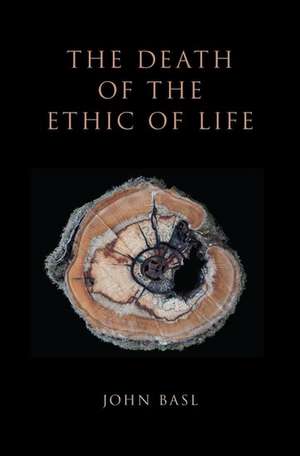The Death of the Ethic of Life
Autor John Baslen Limba Engleză Hardback – 21 mar 2019
Preț: 478.92 lei
Preț vechi: 586.56 lei
-18% Nou
Puncte Express: 718
Preț estimativ în valută:
91.67€ • 99.61$ • 77.05£
91.67€ • 99.61$ • 77.05£
Carte disponibilă
Livrare economică 20-26 martie
Preluare comenzi: 021 569.72.76
Specificații
ISBN-13: 9780190923877
ISBN-10: 0190923873
Pagini: 224
Dimensiuni: 241 x 157 x 23 mm
Greutate: 0.45 kg
Editura: Oxford University Press
Colecția OUP USA
Locul publicării:New York, United States
ISBN-10: 0190923873
Pagini: 224
Dimensiuni: 241 x 157 x 23 mm
Greutate: 0.45 kg
Editura: Oxford University Press
Colecția OUP USA
Locul publicării:New York, United States
Recenzii
With significant references to a variety of philosophical positions on the issue and also to contemporary bioscience research, this solid and accessible book advances the literature on the problem of moral status. ... Summing up: Recommended
This is the most important book on biocentrism in a generation. Basl proposes a new account of biological interests designed to capture the interests of synthetic organisms as well as organisms produced through natural selection and evolution. The arguments here are scientifically well informed and exhibit Basl's typical philosophical care and clarity. This book is essential reading for anyone interested in philosophical accounts of the moral importance of life. I expect it to generate fruitful discussions for years to come.
In clear, crisp prose, and with engaging and provocative arguments, John Basl puts forward the strongest case yet against the view that all living beings, and they alone, have moral status. While reports of the victim's death may be exaggerated, Basl has presented defenders of the ethic of life with a serious challenge if they are to stay the executioner's hand. Required reading for all those interested in who matters from the moral point of view, and why.
This book declares the death of biocentric individualism, the view that all and only individual living organisms are morally considerable. Basl first provides a useful review of argument strategies that proponents have used to defend the view. He then makes a compelling case that the view is untenable, because a plausible account of the interests of non-conscious organisms will imply both that certain 'collectives' of living organisms have interests and that artifacts do too. Basl's sophisticated critique will need to be addressed by any future proponent of biocentric individualism, and if a scholar is interested only in understanding where biocentric individualism came from and why it is a minority position in environmental ethics, then this book contains all that an environmental ethicist who isnt a champion of the view needs to know about it.
This is the most important book on biocentrism in a generation. Basl proposes a new account of biological interests designed to capture the interests of synthetic organisms as well as organisms produced through natural selection and evolution. The arguments here are scientifically well informed and exhibit Basl's typical philosophical care and clarity. This book is essential reading for anyone interested in philosophical accounts of the moral importance of life. I expect it to generate fruitful discussions for years to come.
In clear, crisp prose, and with engaging and provocative arguments, John Basl puts forward the strongest case yet against the view that all living beings, and they alone, have moral status. While reports of the victim's death may be exaggerated, Basl has presented defenders of the ethic of life with a serious challenge if they are to stay the executioner's hand. Required reading for all those interested in who matters from the moral point of view, and why.
This book declares the death of biocentric individualism, the view that all and only individual living organisms are morally considerable. Basl first provides a useful review of argument strategies that proponents have used to defend the view. He then makes a compelling case that the view is untenable, because a plausible account of the interests of non-conscious organisms will imply both that certain 'collectives' of living organisms have interests and that artifacts do too. Basl's sophisticated critique will need to be addressed by any future proponent of biocentric individualism, and if a scholar is interested only in understanding where biocentric individualism came from and why it is a minority position in environmental ethics, then this book contains all that an environmental ethicist who isnt a champion of the view needs to know about it.
Notă biografică
John Basl is Assistant Professor of Philosophy at Northeastern University. He works in normative philosophy and applied ethics, with emphasis on the ethical and epistemological challenges raised by emerging technologies. He is the co-editor of Designer Biology: The Ethics of Intensively Engineering Biological and Ecological Systems (Lexington Books, 2013).
